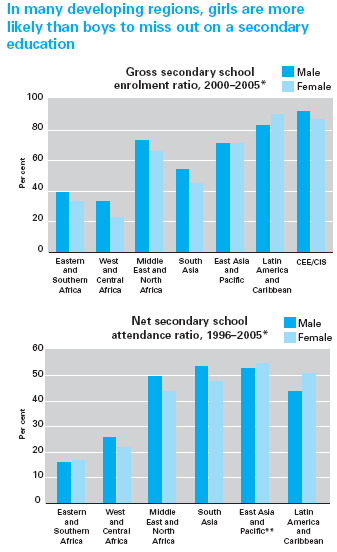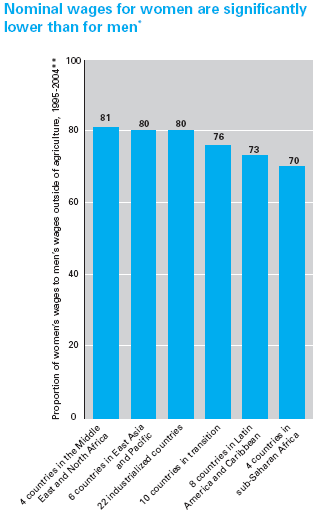UNICEF Gender Equality Report
 Via Ezra Klein, I see that UNICEF has published its annual “State of the World’s Children” report (PDF available here). It’s subtitle gives you a good clue of the contents: “Women and Children: The Double Dividend of Gender Equality.”
Via Ezra Klein, I see that UNICEF has published its annual “State of the World’s Children” report (PDF available here). It’s subtitle gives you a good clue of the contents: “Women and Children: The Double Dividend of Gender Equality.”
Not surprisingly, women’s rights are strongest in the most prosperous societies. The causal relationship is debatable, to be sure, but there’s not much doubt that societies in which women have the right to an education, to own property, to decide when and whether to have children, and the like are going to be better off than those in which that’s not the case.
Still, much of the report is rather heavy handed in its agenda.

Now, frankly, I find it more interesting that less than forty percent of the children in Africa are getting a secondary education than that there’s a smallish gap in gender equality in education there. Indeed, girls’ attendance is actually slightly higher than boys’ in parts of the developing world.
This chart, which caught Ezra’s eye, may or may not be particularly interesting:

He’s right that “what’s remarkable about the wage gap is how near-constant it is across the world.” Yet, different outcomes are not necessarily the result of rigged rules. In the West, women have had full property rights, access to education, and the like for more than a generation. In some countries, the tradition goes back half a century or more. Yet, the wage gap persists.
Without looking at multiple variables, though, it’s not that interesting. Choices matter.
In the West, women disproportionately chose lower-earning occupations, like teaching school, that allow more flexibility. They are also more likely then men to take sabbaticals from their work to raise children. The report notes that,
Factors such as the amount of time women spend working outside the household, the conditions under which they are employed, who controls the income they generate, and the costs and quality of childcare determine how the work undertaken by women in the labour market affects their own well-being and that of children.
Well. . . yeah. Substitute “men” for “women” in that sentence and it still holds true. If you get a PhD from Harvard and then become a teacher or, shudder, a writer, you’re likely going to earn less money than a high school drop-out who learned a trade, too.
Now if women (or young girls) are being forced to raise children and denied the opportunity to go to school or pursue their chosen careers, it’s a problem. If it’s a voluntary decision that’s in the best interests of the family, though, not so much.
In many countries, high-quality childcare remains prohibitively expensive for low-income families in the absence of state provision or subsidies. Parents often rely on extended family members or older children — most often girls — to provide childcare while they work, often at the expense of children’s education.
Right. So, if you have children and you can’t earn more net income than you’d pay for child care, it’s more economically efficient to care for your own children. That’s also true of less time-consuming activities like food preparation, household cleaning, and lawn care.
The suggestion that the government should pay for child care so that mothers can nonetheless take jobs that pay less than child care makes no sense at all. Somebody has to actually pay for that. That somebody is the tax paying public. So, rather than taking care of your own kids, the government is going to do it for you, add on the costs of various bureaucratic waste and inefficiency, and then charge you and your neighbors.





The suggestion that the government should pay for child care so that mothers can nonetheless take jobs that pay less than child care makes no sense at all. Somebody has to actually pay for that.
Which is precisely why industrialized nations are declining in population. Right now we in the US are at below replacement level birth rates as are all industrial nations, because there simply are not enough jobs being produced by those economies to allow people to afford to have unsubsidized children. Japan is in crisis with regard to this (because they are extremely xeophobic)and the US is only treading water because of immigration.
I wonder who the hell we think we are going to sell those plasma TV’s to in oder to sustain our economy which will implode with out growth?
Like you, James, I see much less overall schooling for all children in the third & fourth worlds, & only a small degree of boy/girl educational differences. Beyond that, I think we would find similar differences between genders in the richer countries also.
Moving on to gender differences in wages, why don’t we also show graphs for the developed nations as well? I believe we would see a similar gender wage gap in our countries.
Women’s rights & opportunities are important, but overall it makes much more sense to feed & educate all children of all societies. It also makes sense to judge their progress against our own, which is sometimes lacking.
simply are not enough jobs being produced by those economies to allow people to afford to have unsubsidized children
I’m not sure what the evidence is of that. We’ve managed to go from an economy that employed virtually no married middle class women to one where the majority of them are employed in a matter of twenty-five years. We also absorb a huge number of immigrants.
We aren’t have a lot of children because we’ve moved from an agrarian to a post-industrial economy, have postponed marriage and childbirth more than a decade, and have excellent birth control.
I’m not sure what the evidence is of that. We’ve managed to go from an economy that employed virtually no married middle class women to one where the majority of them are employed in a matter of twenty-five years.
Right because jobs that paid a decent wage are gone and women have had to enter the workforce in oder to keep consumption expanding to prop up our ponzi form of capitalism.
We aren’t have a lot of children because we’ve moved from an agrarian to a post-industrial economy, have postponed marriage and childbirth more than a decade, and have excellent birth control.
Right, children are a liability in a post-industrial economy just like you pointed out in the post. Women would have to be crazy to give up their prime earning years in oder to have children and risk abandonment by husbands who find a younger cuter model to fool around with leaving the woman to be scolded by the likes of people like you for not selecting the proper mate or earning more net income than you’d pay for child care, it’s more economically efficient to care for your own children.
Look, face it, consumer driven, jackpot capitalism makes having children a liability unless the society as a whole decides to pitch in and help care for them. So birthrates will decline and new markets will have to be found in oder to sell widgets. The post war success was driven by a lot of things but the demographics of the baby boom were a big influence.